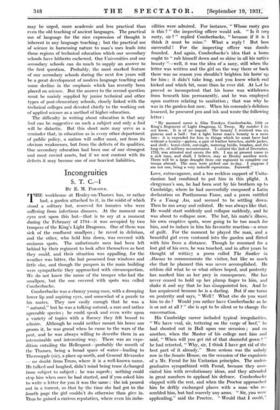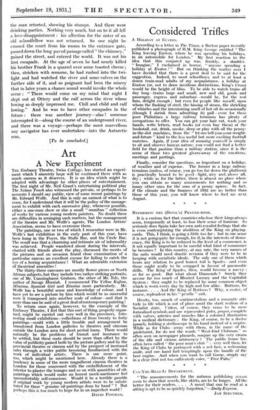Incongruities S. T. C.—I BY E. M. FORSTER. T HE workhouse
at Henley-on-Thames has, or rather had, a garden attached to it, in the midst of which stood a solitary hut, reserved for inmates who were suffering from infectious diseases. At the moment our eyes rest upon this. hut—that is to say at a moment during. the February of 1794—it was occupied by two troopers of the King's Light Dragoons. One of them was sick of the confluent smallpox ; he raved in delirium, and the other, who held him down, was covered with ominous spots. The unfortunate men had been left behind by their regiment to look after themselves as best they could, and their situation was appalling, for the weather was bitter, the but possessed four windows and little else, and though the paupers in the main building were sympathetic they approached with circumspection. We do not know the name of the trooper who had the smallpox, but the one covered with spots was called Comberbacke.
Comberbacke was a clumsy young man, with a drooping lower lip and aspiring eyes, and somewhat of a puzzle to his mates. They saw easily enough that he was a " natural," but he was a talking natural, a rare and rather agreeable species ; he could speak and even write upon a variety of topics with a fluency they felt bound to admire. Although he could neither mount his horse nor groom it, he was grand when he came to the wars of the past, and he was always willing to describe them in an interminable and interesting way. There was an expe-' dition entailing the Hellespont—probably the mouth of the Thames, being a broad space of water—leading to Thermopple (sic), a place up north, and General Alexander — no doubt from Truro, where it is a well-known name.. He talked and laughed, didn't mind being tease d,changed from subject to subject ; he was superb ; nothing could stop him when once he had started, and if you asked him to write a letter for you it was the same : the ink 'poured out in a torrent, so that by the time she had got to the fourth page the girl couldn't do otherwise *than give in. Thus he gained a curious reputation, where even his imbe- cilities were adinired. For instance, '" Whose rusty gun is this ? " the inspecting officer would ask. " Is it very rusty, sir ? " replied Comberbacke, " because if it is I think it must be mine." What a reply ! But how successful ! For the inspecting officer was dumb- founded. And again, Comberbacke's idea that a horse ought to " rub himself down and so shine in all his native beauty "—well, it was the idea of a Zany, still when the letter was written and the girl on the way there or back there was no reason you shouldn't brighten his horse up for him ; it didn't take long, and you knew which end kicked and which bit, more than he ever did. At last he proved so incompetent that his horse was withdrawn from beneath him permanently, and he was employed upon matters relating to sanitation ; that was why he was in the garden-hut now. When his comrade's delirium lessened, he procured pen and ink and wrote the following letter : " My assumed name is Silas Tomkyn Comberbackee 15th or King's Regiment of Light Dragoons, G. Troop. My number I do not know. It is of no import. The bounty I received was six guineas and a half : but a light horse man's bounty is a mere lure : it is expended for him in things which he must have had without a bounty—gaiters, a pair of leather breeches, stable jacket, and shell ; horse-cloth, surcingle, watering bridle, brushes, and the long etc. of military accoutrement. I enlisted the 2nd of December, 1793, was attested and sworn the 4th. I am at present nurse to a sick man, and shall, I believe, stay at Henley another week. There will be a large draught from our regiment to complete our troops abroad. The men were picked out to-day. I suppose I am not one, being a very indocile equestrian. Farewell."
Love, extravagance, and a too reckless support of. Unita- rianism had combined to put him in this plight. A clergyman's son, he had been sent by his brothers up to Cambridge, where he had successfully composed a Latin declaration on Posthumous Fame, and a poem entitled To a Young Ass, and seemed to be settling down. Then he ran away and enlisted. He was always like that. He would start suddenly and collapse suddenly, and he was about to collapse now. The hut, his mate's illness, his own eruptive spots, were going to be too much for him, and to induce in him his favourite reaction-a sense of guilt. For the moment he played the man, and a beautiful girl even ventured into the garden and flirted with him from a distance. Though he mourned for a lost girl of his own, he was touched, and in after- years he thought of writing a poem called The Soother in Absence to commemorate the visitor, but like so much else that he planned this was never accomplished. He seldom did what he or what others hoped, and posterity has marked him as her prey in consequence. She has never ceased to hold up her plump finger to him, and shake it and say that he has disappointed her. And he has acquiesced because he is a darling. But if one turns' on posterity and says, " Well ! What else do you want him to do ? Would you rather have Comberbacke as he is or not at all ? " she is apt to be silent or to change the conversation.
His Cambridge career included typical irregularities. " We have veal, sir, tottering on the verge of beef," he had shouted out in Hall upon- one occasion ; and on another, when the Master of his college met him and said, " When will you get rid of that shameful gown ? "
he had retorted, " WhY, sir,' I think I have got rid of the best part of it already." More serious was the unholy row in the Senate House, on the occasion of the .expulsion of a Mr. Frend for his Unitarian principles. The under- graduates. sympathized with Frend, because they asso- ciated him with revolutionary ideas, and they attended in great numbers to applaud his defence. Comberbacke clapped with the rest, and when the Proctor approached him he deftly exchanged places with a man who re- sembled him, but had scarcely any arms. " Sir, you were applauding," said the Proctor. " Would that I could," the man retorted, showing his stumps. And there were drinking parties. Nothing very much, but on to it all fell a love-disappointment : his affection for the sister of an old schoolfellow was not returned. So one night he crossed the court from his rooms to the entrance gate, passed down the long paved passage called "the chimney," gained the street, and entered the world. It was not his first escapade. At the age of seven he had nearly killed his brother Frank in a quarrel over some toasted cheese ; then, stricken with remorse, he had rushed into the twi- light and had watched the river and some calves on the further side of it, and so poignant had been the misery that in later years a chance sound would invoke the whole scene : " There would come on my mind that night I slept out at Ottery and the calf across the river whose lowing so deeply impressed me. Chill and child and calf lowing." And he was to have other escapades in the future : there was another journey—alas ! someone interrupted it—along the course of an underground river, and there was a voyage—perhaps the most marvellous any navigator has ever undertaken—into the Antarctic seas.
[To be concluded.]



































 Previous page
Previous page